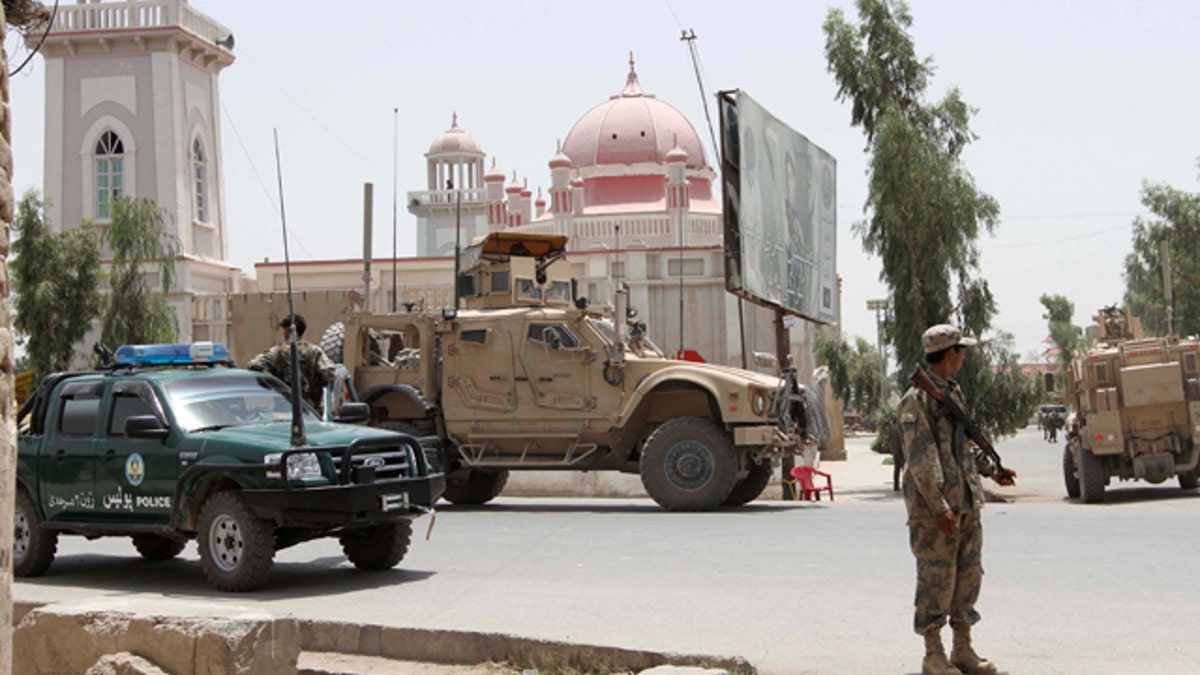
July 14: Afghan and U.S forces stand outside the mosque after a suicide attack in Kandahar, Afghanistan. (AP)
BRUSSELS – NATO defense leaders gathering here this week remain committed to the war in Afghanistan, according to U.S. and alliance officials, but there are growing signs that the Afghan political and military hostilities against the coalition are starting to wear on the coalition.
Defense Secretary Leon Panetta and other U.S. officials heading to the meetings say they expect to reassure allies that military commanders are doing all they can to stem the tide of insider attacks, in which Afghan troops or insurgents dressed in their uniforms turn their guns on the coalition forces that they are training and fighting alongside.
Compounding those military threats, however, is a recent spike in political tensions between Afghanistan's government leaders and the U.S.
Afghan President Hamid Karzai complained that the war effort is wrongheaded, and that coalition forces are not fighting the right enemy.
Just days ahead of the NATO meeting, Panetta was uncharacteristically sharp, criticizing Karzai for complaining rather than thanking the troops who have sacrificed their lives for his country. Karzai's argument that NATO is wrongly going after the Taliban in Afghanistan when it should be fighting insurgents in Pakistan's safe havens could further erode support for the war, particularly among members of Congress.
Panetta's pique reflects the frustration of his military commanders, who have seen more than 2,000 U.S. troops die in the 11-year war. And it can only fuel the increasingly strident grumbling by American lawmakers who are facing hotly contested elections next month, and are hearing from constituents wondering why the U.S. is pouring billions of dollars into a fight that Afghanistan's shaky and corruption-plagued government may no longer support.
Still, Panetta and allied leaders, including NATO Secretary-General Anders Fogh Rasmussen, insist that the war strategy and the timeline remain firm. They say the coalition will stick to the withdrawal schedule, which has combat forces leaving and Afghan forces taking over security of the country by the end of 2014.
Panetta told reporters traveling with him that the ministers will discuss the progress that has been made since they met for a summit in Chicago earlier this year.
"I'll also reassure allies of our strong commitment to finishing the job in Afghanistan alongside our allies," he said.
Defense ministers on Wednesday will also hear from Marine Gen. John Allen, the top U.S. commander in Afghanistan, who will discuss measures the military has taken to reduce the insider attacks.
The attacks, which have killed more than 53 coalition troops this year, have imperiled the strategy by eating away at the trust between the allied forces and the Afghans they were sent there to mentor and train.
"My goal is to make clear to NATO and to our allies that we are taking all steps necessary to confront this issue and that it should not be allowed to deter us from the plan that Gen. Allen put in place," said Panetta.
With support for the war ebbing across America and much of the world, there have been growing calls for a speedier withdrawal.
That prospect raises alarm among commanders who worry that they won't have the forces they need to do the training and counterterrorism operations they believe necessary to continue the transition of security to the Afghan troops while also keeping the Taliban from resurging.
The ministers will also begin the planning process for the post-2014, NATO-led mission, which is likely to include continuing training and ongoing U.S. commando operations.
On Tuesday, the allies are scheduled to discuss the widening gap in defense spending between the U.S. and the European allies, who have been cutting military budgets as part of their financial austerity measures. In the middle of the past decade, the U.S. accounted for about 63 percent of total alliance spending, in contrast to 77 percent today.
Responding to a question about Panetta's criticism of Karzai's complaints that troops should focus on Pakistan insurgents coming across the border rather than the Taliban in the country, a NATO official would say only that the alliance's operations were limited to Afghanistan.
"Therefore NATO is not in a position to take action on militants on the other side of the border," said the official, who could not be named in line with alliance rules.
"Obviously we've looked at (this issue), but it is not something that NATO can take the lead in," he said. "It is always important to remember that for NATO, the limit of our operations is the borders of Afghanistan."
The U.S. has ramped up its unmanned drone campaign targeting insurgents that wage attacks then return to Pakistan safe havens, including the Haqqani network. But there are ongoing frustrations that Pakistan is not doing enough to tamp down the militants within its borders.




